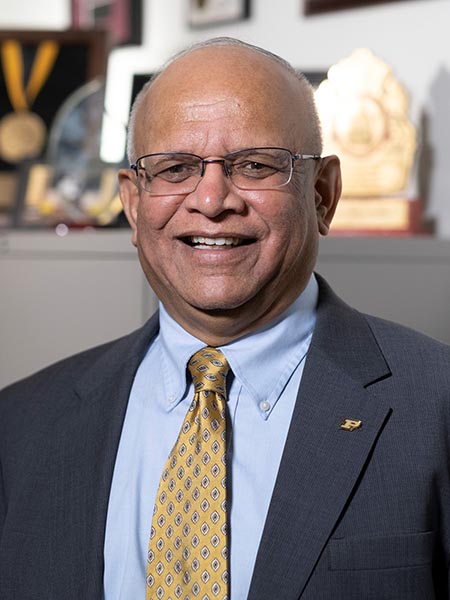ME's Gore selected for ASME's Potter Gold Medal

Jay Gore, the Reilly University Chair Professor in the School of Mechanical Engineering, has been awarded the 2025 James Harry Potter Gold Medal from the American Society of Mechanical Engineers (ASME).
The medal was established in 1980 in recognition of eminent achievement or distinguished service in the appreciation of the science of thermodynamics and its applications in mechanical engineering.
Gore was selected “for the discovery of big-data-based exergy efficiencies in the optimal operation of Rankine-cycle-based power plants, and for extensive contributions to the emerging fields of big data, convolutional neural networks, machine learning, and AI in physics-based models of energy.”
His nomination was based on the work performed by him and four former students involving maximization of boiling efficiency for a large coal burning power plant in North Dakota. During the two-year project, the team studied big data, separated bad data from good data, utilized the good data to construct physics-based ML models, and built AI-based operating practices for minimizing emissions while maximizing efficiency and profitability of the boiler and the entire coal burning power plant.
“This award is a recognition of the strength of not only thermodynamics research, but also thermodynamics teaching at Purdue,” said Gore, who joined the Purdue faculty in 1991. “Certainly, the subject has a reputation for being challenging to our sophomores and juniors. However, the faculty colleagues in our schools recognize the importance of the subject and trust the mechanical engineering faculty to teach it effectively. In fact, the project that led to the National Rural Energy Cooperatives Association (NRECA)-led team working on the North Dakota power plant was initiated by a Purdue alumnus remembering our class.”
In addition to the NRECA, Gore’s team collaborated with engineers and scientists from Great River Energy and Pacific Northwest National Laboratories, with financial support from the Office of Fossil Energy in the U.S. Department of Energy.
For more than three decades, Gore has taught thermodynamics at the undergraduate level and combustion at the graduate level. He also developed a new graduate course, “Artificial Intelligence (AI) in Thermal Systems.” He is the recipient of the Arden L. Bement Jr. Award and is a fellow of ASME and the American Institute of Aeronautics and Astronautics and an international fellow of the Combustion Institute.
Gore will accept the medal during the 2025 Summer Heat Transfer Conference July 8-10 in Colorado.
